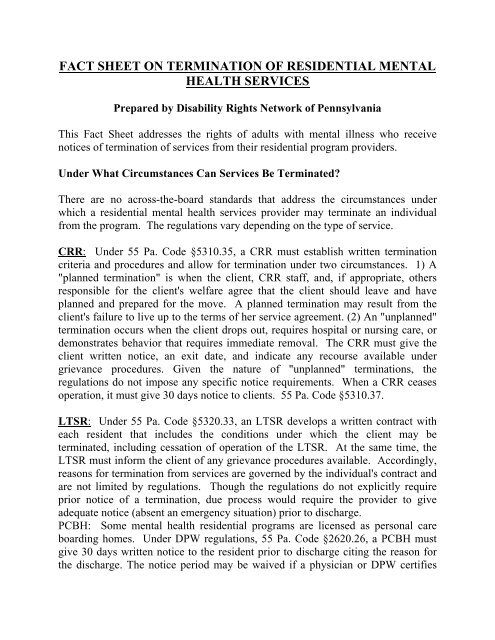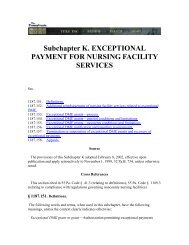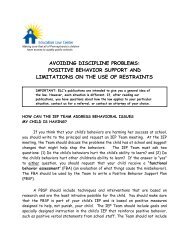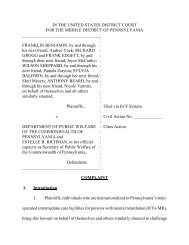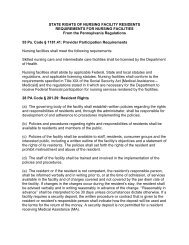fact sheet on termination of residential mental health services
fact sheet on termination of residential mental health services
fact sheet on termination of residential mental health services
You also want an ePaper? Increase the reach of your titles
YUMPU automatically turns print PDFs into web optimized ePapers that Google loves.
FACT SHEET ON TERMINATION OF RESIDENTIAL MENTALHEALTH SERVICESPrepared by Disability Rights Network <strong>of</strong> PennsylvaniaThis Fact Sheet addresses the rights <strong>of</strong> adults with <strong>mental</strong> illness who receivenotices <strong>of</strong> terminati<strong>on</strong> <strong>of</strong> <strong>services</strong> from their <strong>residential</strong> program providers.Under What Circumstances Can Services Be Terminated?There are no across-the-board standards that address the circumstances underwhich a <strong>residential</strong> <strong>mental</strong> <strong>health</strong> <strong>services</strong> provider may terminate an individualfrom the program. The regulati<strong>on</strong>s vary depending <strong>on</strong> the type <strong>of</strong> service.CRR: Under 55 Pa. Code §5310.35, a CRR must establish written terminati<strong>on</strong>criteria and procedures and allow for terminati<strong>on</strong> under two circumstances. 1) A"planned terminati<strong>on</strong>" is when the client, CRR staff, and, if appropriate, othersresp<strong>on</strong>sible for the client's welfare agree that the client should leave and haveplanned and prepared for the move. A planned terminati<strong>on</strong> may result from theclient's failure to live up to the terms <strong>of</strong> her service agreement. (2) An "unplanned"terminati<strong>on</strong> occurs when the client drops out, requires hospital or nursing care, ordem<strong>on</strong>strates behavior that requires immediate removal. The CRR must give theclient written notice, an exit date, and indicate any recourse available undergrievance procedures. Given the nature <strong>of</strong> "unplanned" terminati<strong>on</strong>s, theregulati<strong>on</strong>s do not impose any specific notice requirements. When a CRR ceasesoperati<strong>on</strong>, it must give 30 days notice to clients. 55 Pa. Code §5310.37.LTSR: Under 55 Pa. Code §5320.33, an LTSR develops a written c<strong>on</strong>tract witheach resident that includes the c<strong>on</strong>diti<strong>on</strong>s under which the client may beterminated, including cessati<strong>on</strong> <strong>of</strong> operati<strong>on</strong> <strong>of</strong> the LTSR. At the same time, theLTSR must inform the client <strong>of</strong> any grievance procedures available. Accordingly,reas<strong>on</strong>s for terminati<strong>on</strong> from <strong>services</strong> are governed by the individual's c<strong>on</strong>tract andare not limited by regulati<strong>on</strong>s. Though the regulati<strong>on</strong>s do not explicitly requireprior notice <strong>of</strong> a terminati<strong>on</strong>, due process would require the provider to giveadequate notice (absent an emergency situati<strong>on</strong>) prior to discharge.PCBH: Some <strong>mental</strong> <strong>health</strong> <strong>residential</strong> programs are licensed as pers<strong>on</strong>al careboarding homes. Under DPW regulati<strong>on</strong>s, 55 Pa. Code §2620.26, a PCBH mustgive 30 days written notice to the resident prior to discharge citing the reas<strong>on</strong> forthe discharge. The notice period may be waived if a physician or DPW certifies
that a delay in discharge would jeopardize the <strong>health</strong> or safety <strong>of</strong> the resident orothers in the home, including circumstances in which the resident needs psychiatricor l<strong>on</strong>g-term care, has been abused in the home, or when DPW has initiated closure<strong>of</strong> the home. The regulati<strong>on</strong>s, 55 Pa. Code §2620.27, also establish standards andprocedures governing discharge when a resident's physical c<strong>on</strong>diti<strong>on</strong> requires ahigher level <strong>of</strong> care and when the resident must be removed because he is a dangerto himself or others. While physical and psychiatric <strong>health</strong> c<strong>on</strong>diti<strong>on</strong>s areexplicitly referenced as bases for discharge, this does not necessary mean that theseare the <strong>on</strong>ly reas<strong>on</strong>s for which a PCBH can decide to discharge a resident.What Recourse Does An Individual Have When He Receives A Terminati<strong>on</strong>Notice?An individual whose provider issues a discharge notice can appeal that decisi<strong>on</strong>through the county administrative process designed for appeals underPennsylvania's Local Agency Law, 2 Pa. C.S. §§551-555. Each County shouldhave written procedures that govern appeals <strong>of</strong> denials and terminati<strong>on</strong>s <strong>of</strong><strong>services</strong>. The individual should receive informati<strong>on</strong> about the appeal process at thetime he receives written notice <strong>of</strong> his terminati<strong>on</strong> from the program. In anadministrative appeal, the individual has the right to present written evidence andtestim<strong>on</strong>y and to cross-examine witnesses. The agency must issue a writtendecisi<strong>on</strong> explaining the basis for its decisi<strong>on</strong>.The Local Agency Law does not expressly allow the individual to remain in hisprogram pending the outcome <strong>of</strong> his administrative appeal. However, an argumentcould be made that, given the nature <strong>of</strong> the deprivati<strong>on</strong> involved when a pers<strong>on</strong>'s<strong>residential</strong> program is terminated, the individual should not be discharged until anadministrative decisi<strong>on</strong> <strong>on</strong> his appeal is rendered unless the reas<strong>on</strong> for discharge(e.g., medical or psychiatric emergency) warrants immediate removal.If the individual is not satisfied with the outcome <strong>of</strong> the county administrativeprocess, the Local Agency Law allows him to appeal the decisi<strong>on</strong> to the Court <strong>of</strong>Comm<strong>on</strong> Pleas. 2 Pa. C.S. §751-752; 42 Pa. C.S. §933(a)(2).08/04


